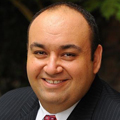Personal Mention
 Scott Mory, associate senior vice president and director of the University of Southern California’s campaign, has been appointed vice president for University Advancement, effective Oct. 1. In his new role, Mory will lead the university’s alumni engagement and fundraising efforts. He will work closely with university leadership, the University Advancement Division, and partners across campus to provide the resources faculty, staff and students need, while building a financial foundation for the university’s excellence in the future. “This is a critical position for the university, as we seek to build our advancement team and build on recent successes,” President Subra Suresh said. “Scott’s leadership, strong track record and passion will help elevate our advancement efforts to a new level.” At USC, Mory helped build the campaign infrastructure that coordinates activities among USC’s 20 schools and units and more than 450 development staff university-wide. He leads USC’s efforts to develop and implement strategies for the campaign’s top prospects. USC’s campaign recently passed the $4.4 billion mark, on the way to a $6 billion goal, making it one of the largest higher education campaigns in history. Find out more about Mory.
Scott Mory, associate senior vice president and director of the University of Southern California’s campaign, has been appointed vice president for University Advancement, effective Oct. 1. In his new role, Mory will lead the university’s alumni engagement and fundraising efforts. He will work closely with university leadership, the University Advancement Division, and partners across campus to provide the resources faculty, staff and students need, while building a financial foundation for the university’s excellence in the future. “This is a critical position for the university, as we seek to build our advancement team and build on recent successes,” President Subra Suresh said. “Scott’s leadership, strong track record and passion will help elevate our advancement efforts to a new level.” At USC, Mory helped build the campaign infrastructure that coordinates activities among USC’s 20 schools and units and more than 450 development staff university-wide. He leads USC’s efforts to develop and implement strategies for the campaign’s top prospects. USC’s campaign recently passed the $4.4 billion mark, on the way to a $6 billion goal, making it one of the largest higher education campaigns in history. Find out more about Mory. 
 PBS Nova has published a video featuring the work of Assistant Mechanical Engineering Professor Carmel Majidi (left) and Yong-Lae Park, an assisant professor of robotics, in the field of soft robotics. The video, “Softer, More Human Robots,” showcases research being done in Majidi's Soft Machines Lab and by Park and his students. Several aspects of research are discussed in the video, including wearable and stretchable electronics, liquid metal circuitry, switches to adjust tendon rigidity, robotics arms and sensor surfaces that respond to touch. Soft robotics research has numerous long-term implications. Wearable robotics could help the elderly with mobility; soft, flexible robots could help in disaster relief efforts, fitting through tight or hard-to-reach spaces; elastic robots could replace organ parts, like artificial valves in a heart; and flexible circuitry made from metal that liquefies at room temperature can become a sensory circuit board, which could eventually act as skin. Watch the video.
PBS Nova has published a video featuring the work of Assistant Mechanical Engineering Professor Carmel Majidi (left) and Yong-Lae Park, an assisant professor of robotics, in the field of soft robotics. The video, “Softer, More Human Robots,” showcases research being done in Majidi's Soft Machines Lab and by Park and his students. Several aspects of research are discussed in the video, including wearable and stretchable electronics, liquid metal circuitry, switches to adjust tendon rigidity, robotics arms and sensor surfaces that respond to touch. Soft robotics research has numerous long-term implications. Wearable robotics could help the elderly with mobility; soft, flexible robots could help in disaster relief efforts, fitting through tight or hard-to-reach spaces; elastic robots could replace organ parts, like artificial valves in a heart; and flexible circuitry made from metal that liquefies at room temperature can become a sensory circuit board, which could eventually act as skin. Watch the video.
Associate Teaching Professor David Kosbie's "Fundamentals of Programming" was named one of the five best computer science courses in the country by Bloomberg Business, which says "Fundamentals is intended to provide a solid coding background and insight into software testing and debugging." The listing quotes CMU's Tom Cortina, an associate teaching professor in the Computer Science Department. “Students rave about the course and the professor — this course is an event,” Cortina said. Structured as an interactive and hands-on experience, the course lets students demonstrate their work at an end-of-term showcase. See the top five courses according to Bloomberg Business.
The U.S. Department of Education’s Institute of Education Sciences (IES) has selected alumnus Nathan VanHoudnos as this year’s outstanding fellow from its Predoctoral Interdisciplinary Research Training Programs in the Education Sciences. IES recognizes one recipient each year for academic accomplishments and contributions to education research. VanHoudnos received his Ph.D. in statistics and public policy. During his time at CMU, he was also a Program for Interdisciplinary Education Research (PIER) fellow. Learn more about VanHoudnos.
After 40 years of service, Norman Chigier, professor emeritus of mechanical engineering, is stepping down from his position as editor of the Progress in Energy and Combustion Science (PECS) journal. PECS reflects decades of research and development in combustion and energy-related subjects covered in review articles. Chigier is a renowned scientist in the fields of combustion and sprays. In 1954, he founded the Combustion Institute, an international nonprofit, scientific and educational organization that serves to promote and disseminate combustion research. He has written several books and contributed hundreds of scientific publications and lectures at internationally leading universities. His work has been honored with prestigious awards, and he has served in many academic capacities. Numerous academic institutions and industrial companies have benefited from his advice. A new team of editors — Professor Hai Wang of Stanford University and Professor Christof Schulz, Duisburg-Essen University — has been appointed by the publisher, with Chigier remaining as editor emeritus.
